在乔治•弗洛伊德于今年5月死于白人警察之手后,抗议系统性种族歧视的活动在全美轰轰烈烈地拉开了帷幕,也促使各大公司发声声援种族平等。他们向员工和公众发布了长篇大论,声称“黑人生命亦宝贵”,承诺向社会公正机构捐资数百万美元,并将六月节(非洲裔美国人士庆祝废除奴隶制的日——译者注)定为公司的节日。面对存在问题的公司文化,高层们道歉的道歉,辞职的辞职。
但职场中的系统性种族歧视不会因为这则新闻得到解决。一项调查显示,超过半数的黑人雇员在职场中都有过受种族歧视的感受。仅有3.2%的高管和高级经理级别雇员是黑人,《财富》美国500强企业中仅有5名黑人首席执行官。另一项调查显示,黑人的薪资比白人低13%,黑人女性的薪资比白人男性低39%,比白人女性低21%。她们要求晋升和加薪的概率与白人女性相当,但结果却大为不如。
《财富》杂志联系了诸多黑人雇员,请他们分享其职场经历。我们收到了来自于高管、中层经理和初级员工的反馈,他们来自于科技、金融、媒体和娱乐、保险、非营利性机构、时尚、健康等行业。他们共同揭示了数字背后的人性,同时也证明,尽管各大公司当前说的是头头是道,但需要做的工作依然还有很多。
这些反馈已经过编辑,我们仅公布这些人的名字,隐去姓氏,以尊重他们的隐私。

一席之地

多年来,我一直在美国公司工作。随着职位的不断上升,我开始注意到黑人雇员越来越少,最后只剩下我一人。我居住的这个大城市是非洲裔美国大学毕业生比例最高的城市之一。公司的首席执行官系统性地将女性和非洲裔美国人排挤出了领导层,但我只是在袖手旁观。最终,我自己也辞职了,因为我意识到我的薪资还不到我白人同事的一半。当我质问人事部和经理有关此事时,他们面不改色地用谎言来搪塞。——布莱恩,51岁
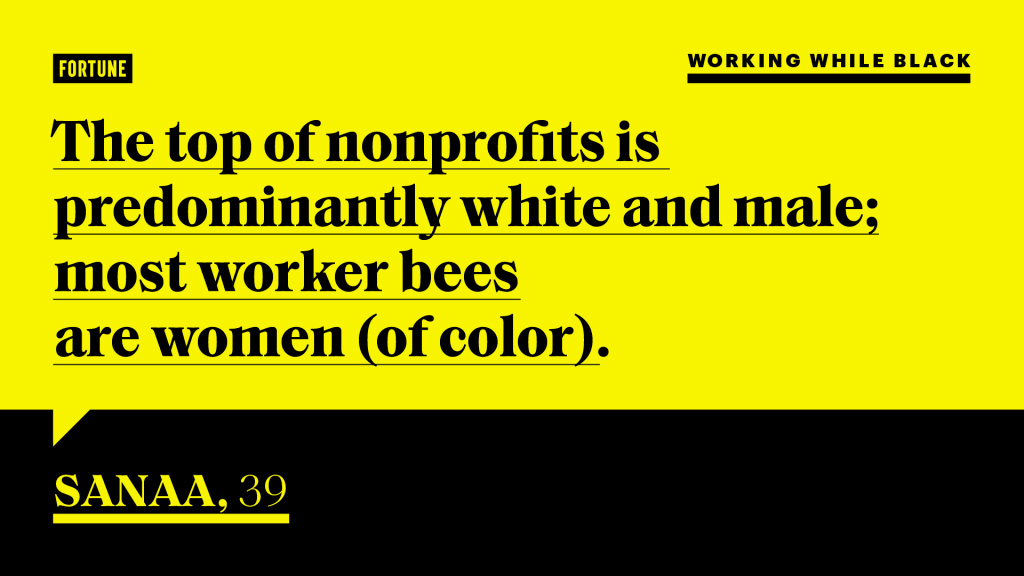
我是一家非营利性机构的高管。这里的偏见和种族问题与企业界一样广泛存在。非营利性机构的顶层基本上都是白人男性,私营领域和政府机构亦是如此;大多数工作人员都是女性(有色人种)。我们需要进行反思,并开始采取我们呼吁私营领域和政府机构采取的同样举措,也就是努力让决策和领导层体现包容性。——莎娜,39岁
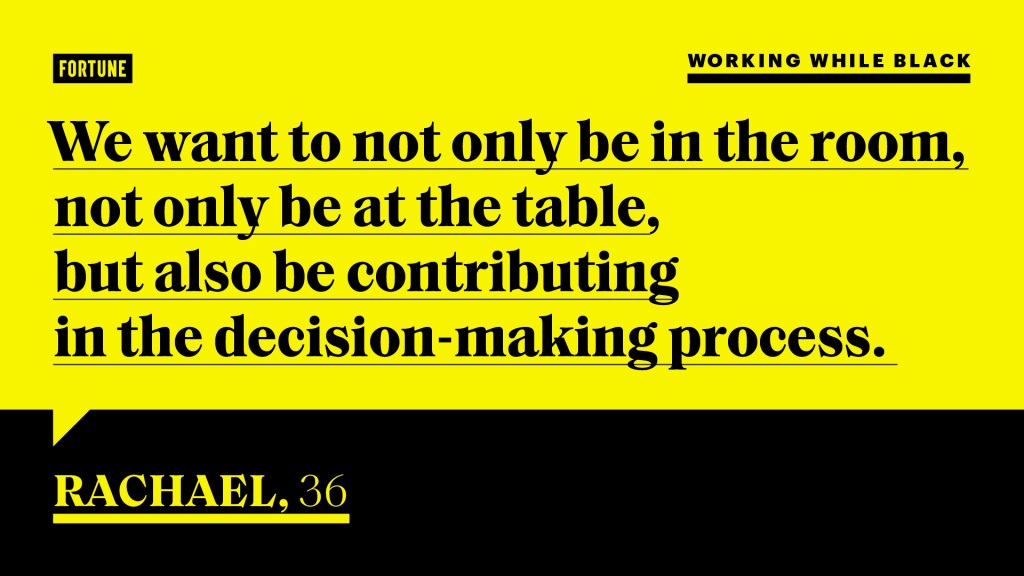
多元化和包容性之间有着很大的区别。我们不仅仅希望在同一个房间、同一个办公桌上工作,同时还希望参与决策流程。尤其是黑人女性!我们的独特能力在于将不可能的事变为可能,并赋予其他人视作无用的事物新含义。在这个世界上,黑人女性不应该只是被当作一种副产品来看待,而是应该得到肯定和歌颂。——蕾切尔,36岁

房间里唯一一个黑人
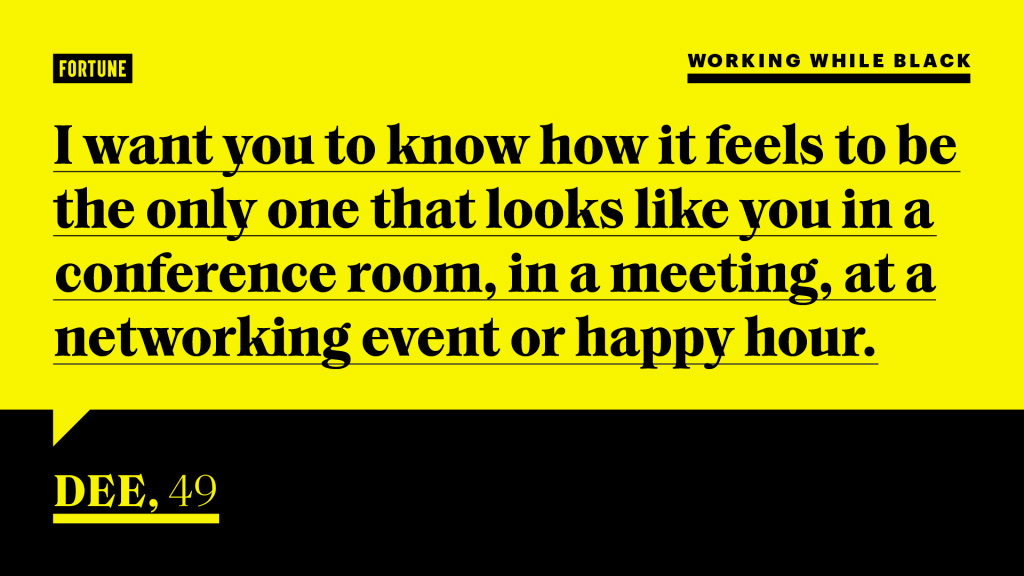
如果你是会议室、会见、交流活动或酒吧欢乐时光中唯一一名黑人,你会有什么样的感受。即便作为同一个国家的公民,但你却不得不不断地学习、迎合另一个群体的文化以及行事方式,你会作何感想?如果你因为害怕丢掉饭碗而无法站起来为自己发声,或纠正他人对你自己或自身文化和所属群体的成见,你会作何感想?如果你在自己的工作岗位上干的很好,而且资历也与你的同事相同或者更好,但却因为你“过于认真”或缺乏沟通而没有得到提拔,你会作何感想?如果你非常希望向领导层发展,但却看到在你之前没有可以参照的先例,你会作何感想?如果投资、恩惠、资助和机会都给了他人,但风险却让自己来承担,你会作何感想?为了做到尽善尽美、体现你所属种族的良好形象,你承受了很大的压力,因为一旦出现错误,你获得另外一次机会的可能性就会变得很低,这时你会作何感想?在这个世界中,你得生活、工作、养孩子,但你的肤色却让你难以进行沟通或获得保护,你会作何感想?——迪,49岁
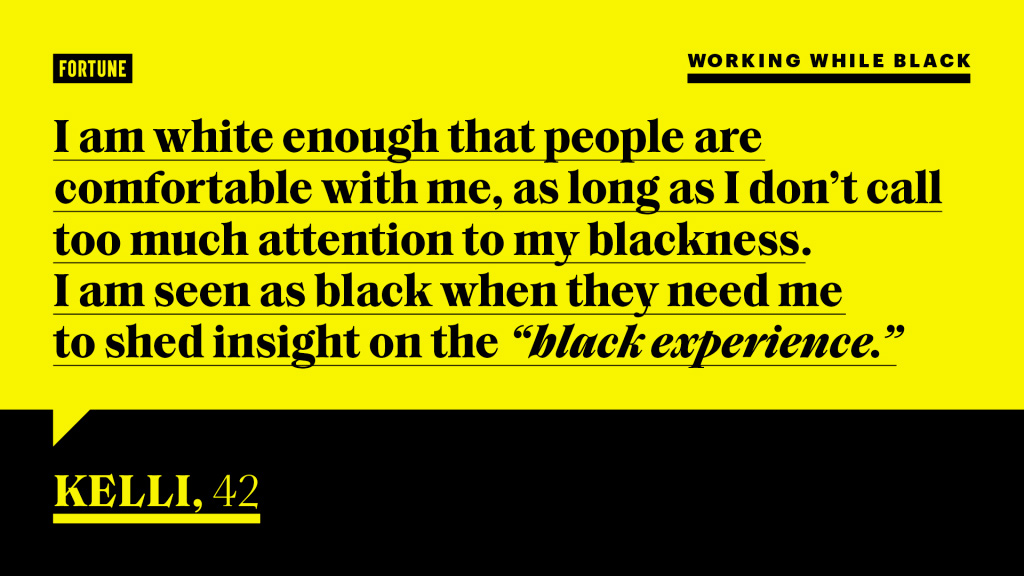
在我的职业生活中,我的种族身份总是感觉像其他人可以随意使用的工具。我的肤色算挺白了,只要我不刻意强调我的黑人身份,人们对我也没有什么抵触。当他们需要我分享自己的洞见和谈论“黑人体验”时会把我当作黑人来看待,就像是我的声音可以解释清楚整个种群的个人和企业所有者想要或需要的事物。在工作环境中,我主动和被动地意识到,我的存在并不能为我带来与同事融洽相处的权力。——凯利,42岁

职场的多元化和包容性并不意味着设立仅满足最少人数的规定指标和感受,因为办公室有50多名员工,分为两种肤色。事实上,当你供职于一家成天喊着多元化、但办公室中仅有一个人和你是一个肤色时,你会觉得这是对自己的侮辱。由于公司成天会提醒你大家并不在同一条起跑线上,一种疏远感会油然而生。我不得不比我的白人同事更加努力地工作,为的是获得同等的尊重,同时抑制自己突出的个性,以消除那种“暴躁黑人女性”的成见或避免被别人称之为“无礼”。如果你希望打造一个真正多元化和包容的职场,你就不能只想着自己可以做的就是在办公室多安排几名不同肤色的员工。——阿兹轧,30岁
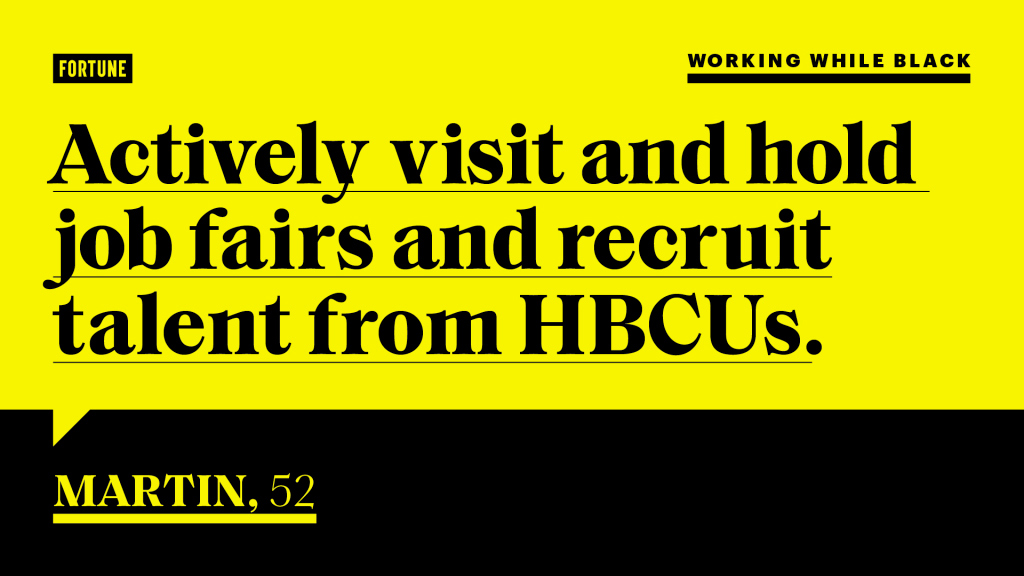
积极地招聘、聘请和提拔黑人,尤其是在领导层。通过知名第三方服务供应商,每年举办有关多元化、包容性的高质量现场培训。积极参加和举办招聘会,并从有着大量黑人人口的市区招聘人才。在黑人历史月举办特别现场活动,邀请专业演讲人士参加。——马丁,52岁

一同小酌
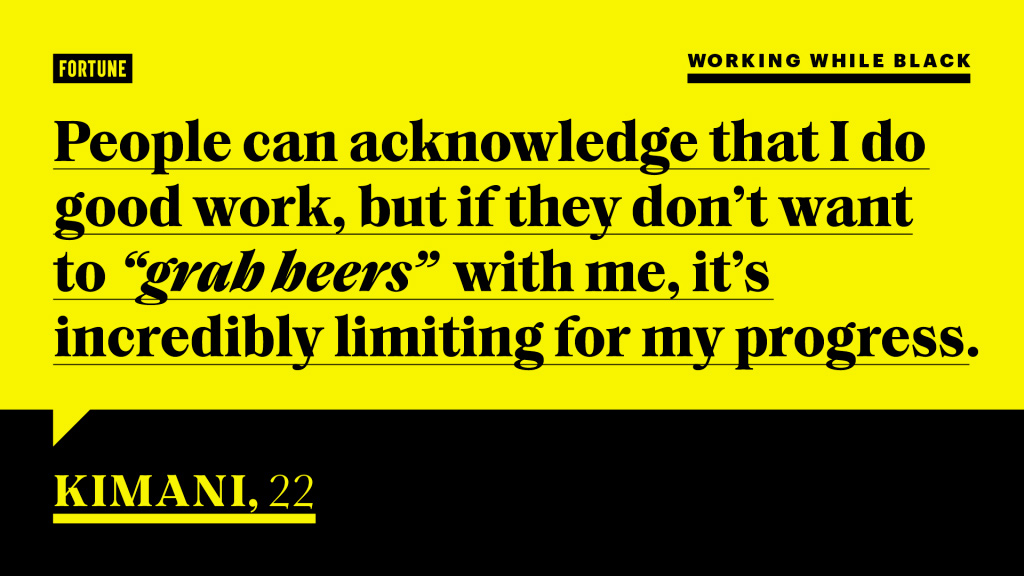
就摆脱偏见而言,人们在提升自我的这个重要方面做的很不够(包括非黑人有色人种),因此在伪装友好时会非常痛苦。而事实在于,我很少看到有同事愿意去与那些自己不喜欢的人交朋友或对其提供指导。人们可能会承认我的工作做的不错,但如果他们不愿和我一块“喝啤酒”,那么对于我的进步来说是一个巨大的障碍,而且自己在晋升和加薪时的境遇便可想而知。这一现象也让我对于该信任谁感到异常多疑,因为我并不知道这个人是否会利用我的劳动力。我遇到过的最佳盟友曾为我两肋插刀,帮助我进步,并为我提供难得的机会,同时指导和资助我的成长(还有支付薪资)。——吉玛尼,22岁

当有关发型和衣着的政策放开之后,我们终于可以在职场展现自我本色。有的人对此表示称赞,有的人则有不同意见。我们并非是一个模子刻出来的,允许自我表达能够让我们的文化大放异彩。——阿雷勒,30岁
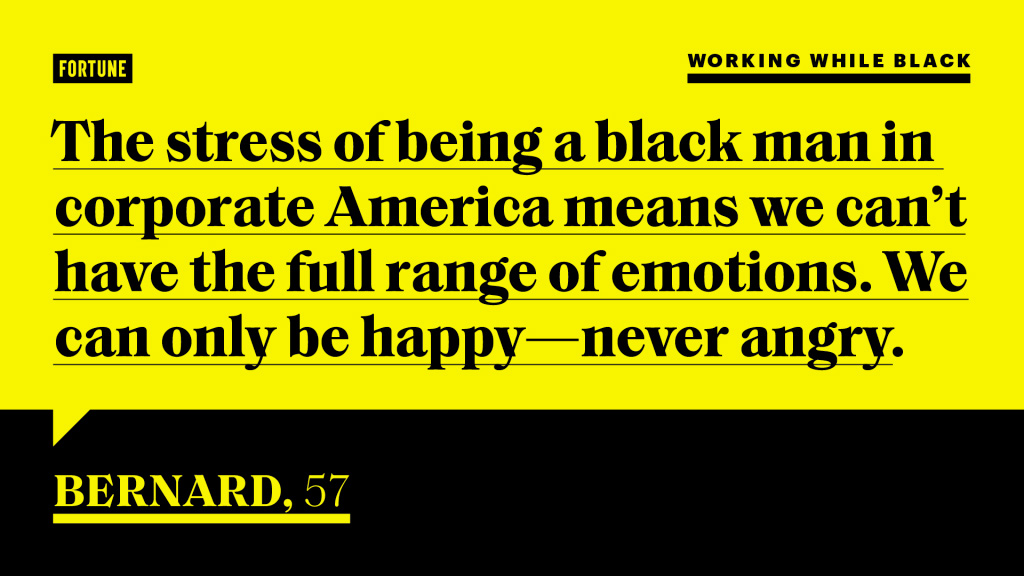
我曾在多家蓝筹公司担任高管职务。我一直都在隐藏自己的黑人文化,因为我觉得在公司就该如此。作为在美国企业工作的黑人,我们所面临的压力意味着我们得压抑自己的部分情绪。我们只能高兴,不能生气。没有人提供指导,因此我们只能自己琢磨,而且当我们琢磨出来之后,最好的机会已经擦身而过,因为我们并不是“圈子”中的一员。——伯纳德,57岁

说到做到
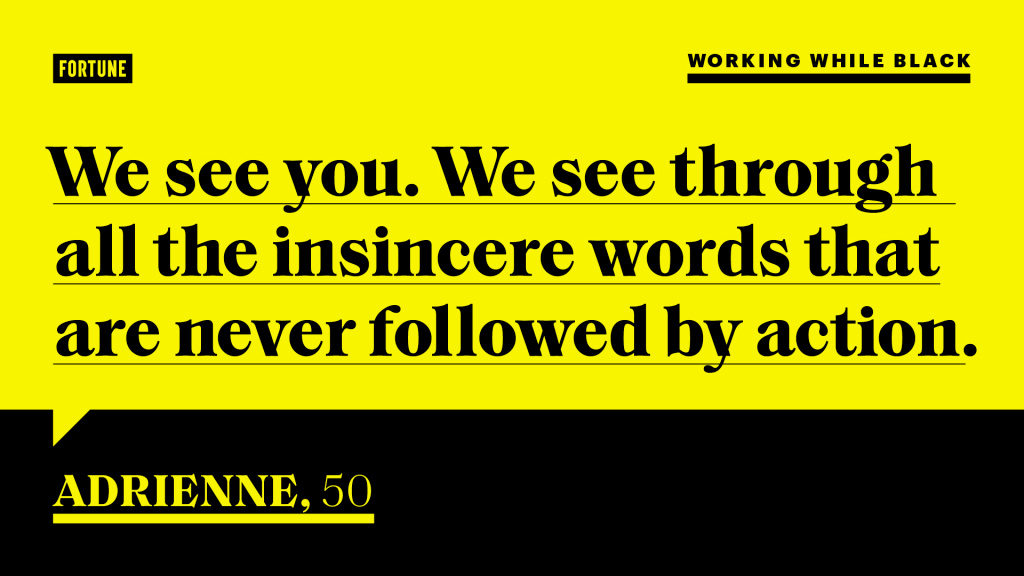
我希望告诉我办公室的白人同事:我们已经看穿了你们这些人。我们看穿了那些从来不会付诸行动的虚伪说辞。我们看到:你会大谈特谈“多元化与包容性”,但从来不采取行动;你会让没有经验的白人小姑娘或小伙“尝试”新职务,并提拔他们,因为你本能地相信他们会在失败中前行;对于同样的工作,黑人拿到的钱比白人少。
我希望告诉白人高管,如果你打算设立资源工作组,那么为他们提供一些资金。不要将所有非白人员工放在一个组——多元文化组。不要说什么“多元化并非是让不同肤色的面孔坐在一个桌子前,而是思想的多元化”这类废话。
不要想方设法让我们相信公司具有包容性,而是要真正做到。这一点要求公司所有人都得承认你所拥有的权利,承认你在没有任何其他理由(不包括他们看起来像你)的情况下,采取了措施刻意提拔白人同事。不妨问问自己,是什么让你对黑人如此反感?问问自己,为什么自己会费尽气力去阻碍黑人的发展,如果公司所有的黑人都决定不回公司工作,这一现象会对公司的利润带来什么影响?
要采取措施,抛弃那些当前已经形成定式思维的方式。读书,并学习那些反对偏见的作品。不要再问黑人,自己如何才能摒弃种族主义或反黑人思想,这个问题应该由你自己来找到答案。——阿德瑞尼,50岁
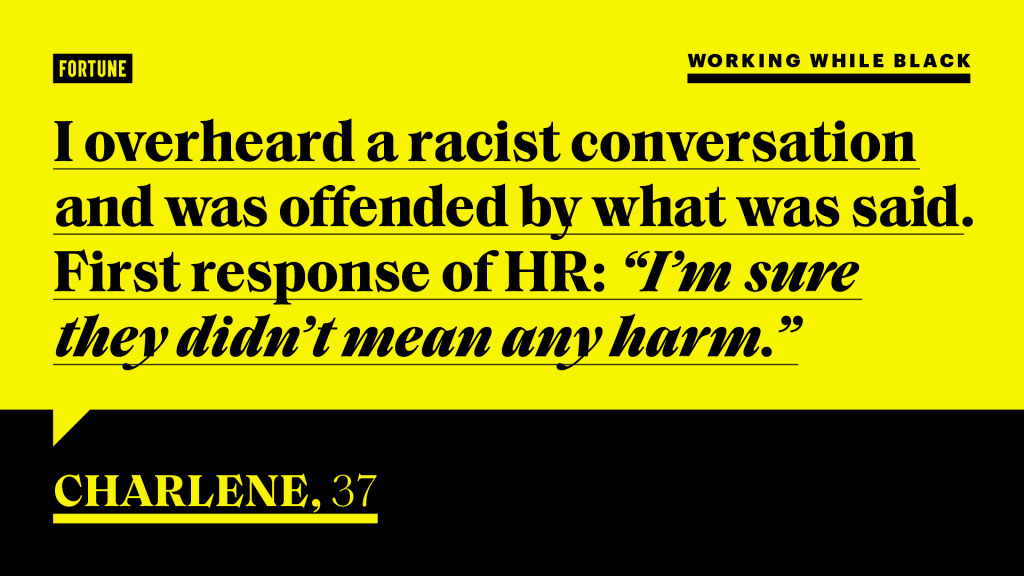
让所有人为其在职场的言语和行为负责。包容性是每一位雇主的义务。我曾在无意间听到了一段包含种族歧视的对话,并对其内容十分反感。人力资源的第一反应是:“我确信他们没有任何恶意。”真的吗?你当时在那吗?你当时听到他们说什么了吗?不要保护这些人,要让他们为此负责。——查伦,37岁
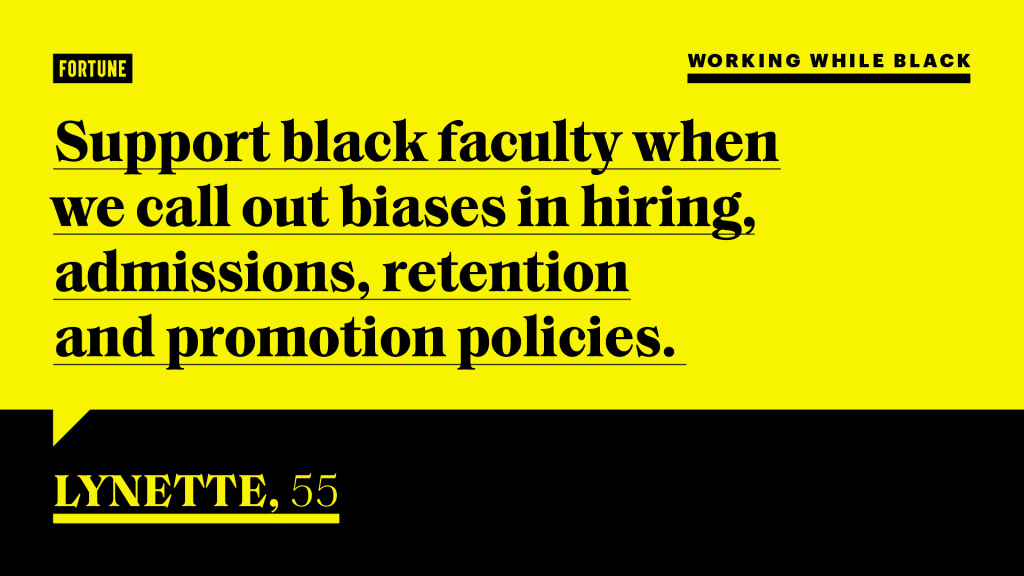
当我们呼喊招聘、录用、留用和升职政策存在歧视时,请支持黑人教职人员,而不是将责任推给“教授治理”制度。正式承认黑人教职人员为照顾学生而付出的隐性工作。切实践行学校宣扬的包容价值。——琳内特,55岁
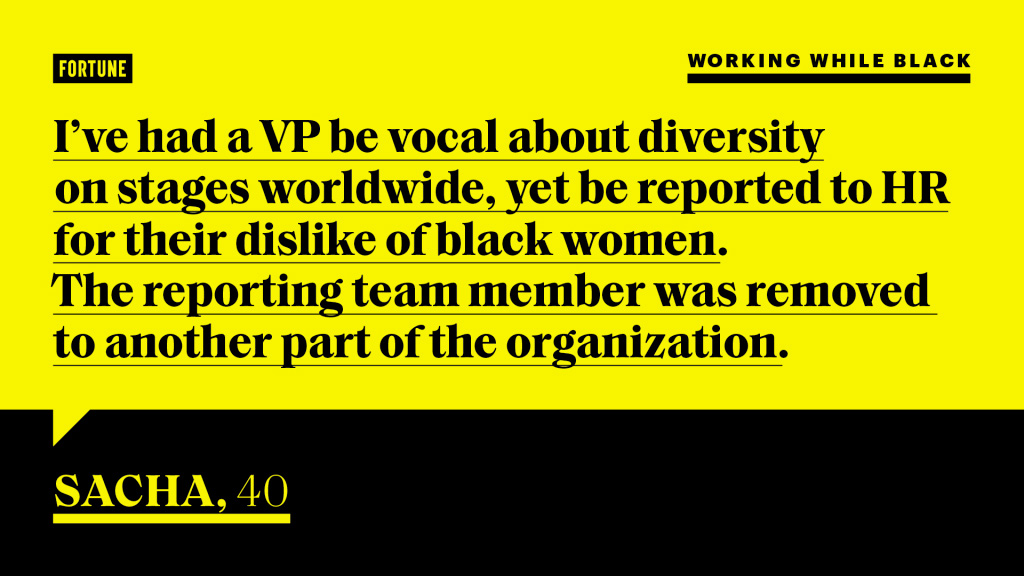
高层领导可以成为歧视罪魁祸首,而且会得到人力资源部门的保护。我曾经遇到过一位副总裁,在全球范围内演讲时嘴里总是念叨着多元化,但却因为讨厌黑人女性而被告到了人力资源部门。当副总裁的团队成员将这个问题反映给人事部门时,这位打报告的人被调至公司的另一个部门。这位副总裁有一个想找工作的朋友。我后来被告知,他的这位朋友(一位在这个领域毫无经验的白人女性)将向我汇报,而且我无法向人事部门抱怨,否则我将会成为这位副总裁的眼中钉。——萨查,40岁
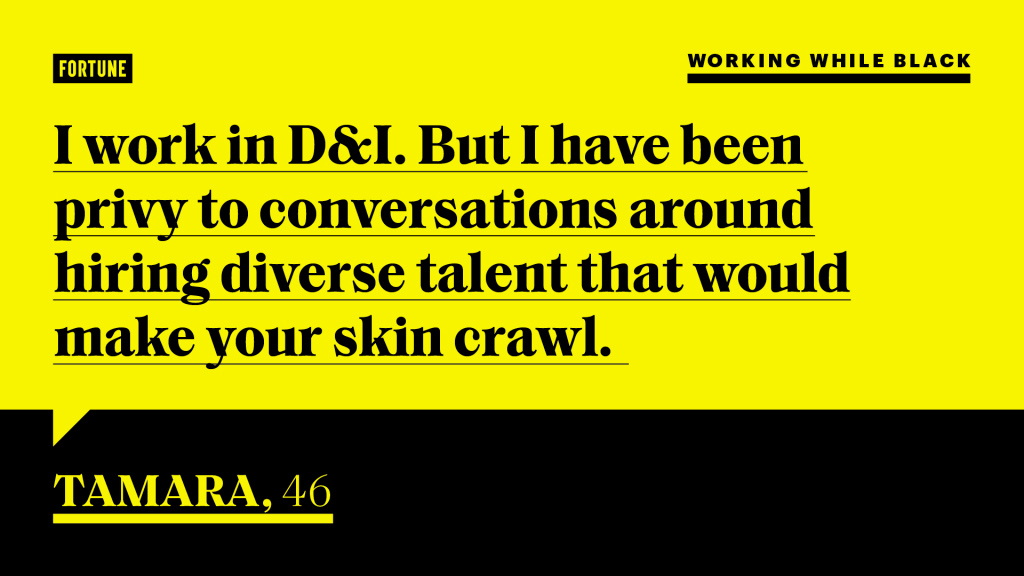
在我工作的地方,只要涉及多元化和包容的问题,人们说的都是头头是道;见鬼,我的工作环境充满了多元化和包容性。但我也参加了有关招聘多元化人才的讨论,真的是让人很不舒服。很明显,并非我所在机构的所有人都信奉多元化和包容性原则及其发挥的作用。公司的各个层面都存在多元化问题,而且我们是前脚招聘后脚就有人辞职。我对自己晋升的能力充满了怀疑,因为我在业绩评审和晋升机会方面总会遭到歧视。
如今,我的白人同事对理解其黑人同事产生了兴趣,因为这是来自于高层的命令。我发现这种新出现的关怀不够真诚。——塔马拉,46岁

对于那些确实希望成为盟友、并支持黑人职业人士多元化和包容性的公司来说,它们需要采取周全的方式来引入这一变化。公司需要对种族平等进行更多的投入,而不是采取条件反射式的举措,例如“欢聚一堂”的说教会。虽然方向对了,但下一步该怎么走?公司需要认真负责地在各个层面和人才培养方面贯彻多元化原则,并制定行动计划来杜绝公司文化和领导层中根深蒂固的系统性种族歧视。——凯瑟琳,39岁

别碰我的头发
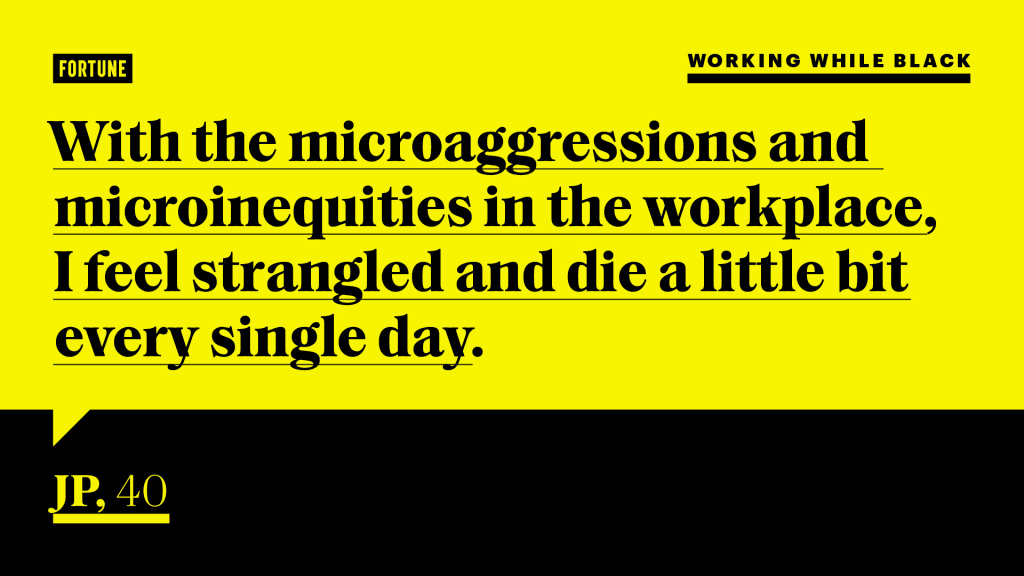
职场的轻度冒犯和轻微歧视让我感到窒息,而且觉得每天都在折寿。当我不得不遮盖我生来具有的肤色来融入公司时,我无法全身心地投入到工作当中。——JP,40岁
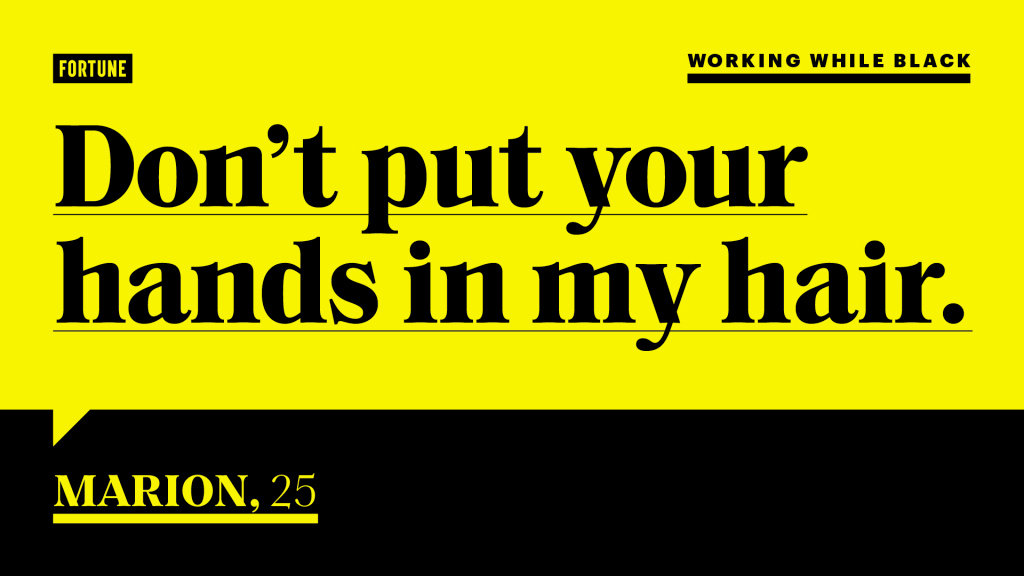
别摸我的头发。不要再用“方便”这类借口,来掩盖你的儿童刊物仅代表白人小孩的事实。不要再将我们弄混,我和我的同事虽然都是黑人,但长的并不相像。即便我们拥有能够胜任的文聘和经验,但升职依然十分渺茫,因为我们并未看见高层中有像我一样肤色的女士。如果公司打算接受并为黑人女性提供同等的机会,请确保不要按照你的标准来以貌取人,难不成我要长得像个模特一样才能得到你对白人女性那样的尊重,何况后者看起来也不像个模特,而且最重要的是,请给我同等的机会。——玛里昂,25岁
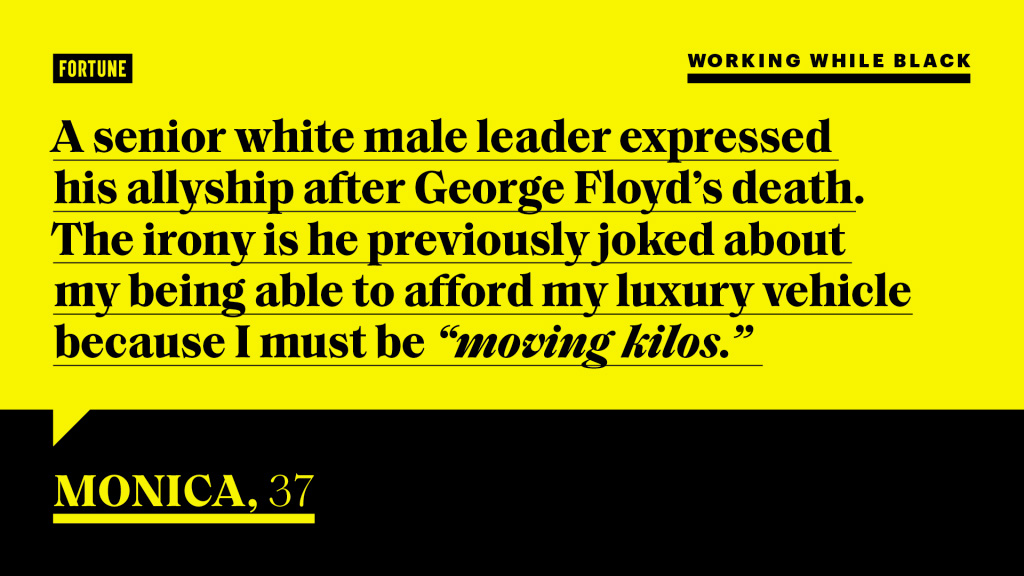
一位白人高管在弗洛伊德死后表达了其对黑人的支持。讽刺的是,他此前曾经开玩笑说,我之所以能买得起好车是因为我肯定在“倒卖东西”。这个黑人必须参与非法活动才可以买得起好东西的潜台词,也正是导致乔治•弗洛伊德和无数其他黑人被警察谋杀的观念。——莫妮卡,37岁
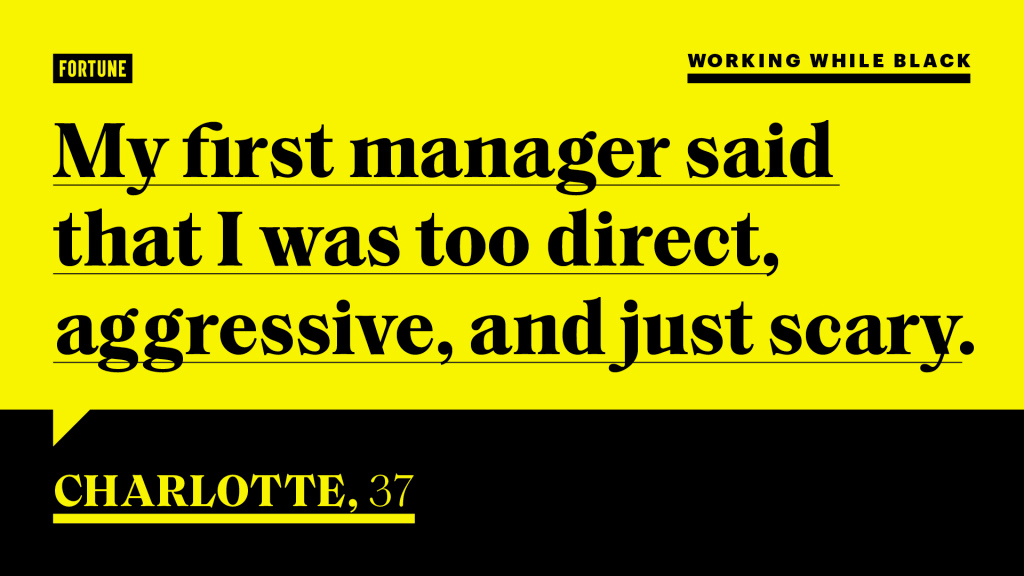
多年来,我一直遭受着轻度冒犯,甚至是种族歧视评论的困扰。我的第一位经理说,我太直接了,过于冲动,而且很恐怖。另一位同事称,我看起来像一个黑猩猩,原因在于我穿的夹克衫。不幸的是,我曾经自以为说这些话的人都是黑人雇员的支持者。如果多元化和包容性的“支持者们”都持有偏见,那么公司如何向多元化和包容性迈进?——夏洛特,37岁

艾米•库博事件比比皆是
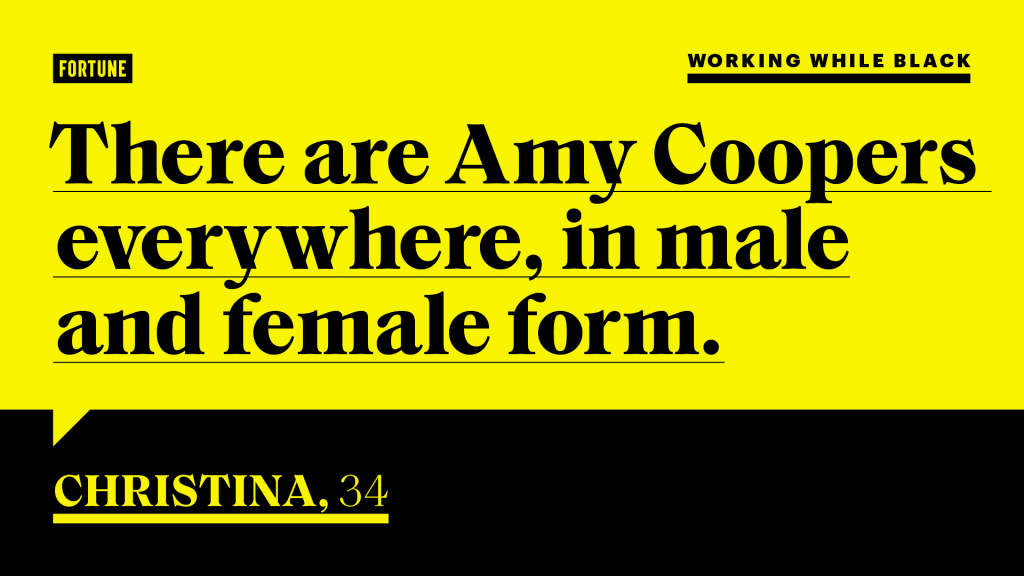
艾米•库博事件比比皆是,受害者有男有女,还有这些被动攻击型的评论,以及有关“肤色”和“情绪化”黑人女性和男性的私下讨论。外向型自由主义实际上披着黑人职员恐惧和威胁论的外衣。他们挥舞着手中的权力,阻碍黑人天才的成长、进步和曝光。感觉每天都得努力去周旋,而他们的偏见却无人过问。——克里斯汀娜,34岁

我要讲的故事不止一个,但我要在这里分享那个几乎夺走我整个人生的那个故事。有人控诉我从另一位经理那里偷了一张支票,后来她自己找到了那张支票。公司办公室在没有调查的情况下开除了我。我采取了行动,将其告上法庭。如果我当时像现在这样更加睿智一些,我就不会同意庭外和解,而是会公开地讲述我曾经遭受过的待遇。——麦琪,50岁

我究竟是谁

我在白人主导的IT行业工作。作为一名黑人女性,我一直在这个他们为非白人创造、却视而不见的有毒世界与他们共事,此事让我感到心力憔悴。在他们创造的这个险恶世界中,黑人总是会因为轻度冒犯问题而被要求进行工作面试。你会感到异常孤立无援,因为没有人可以信任,而且你会看到高级别职位都被那些能力不足的白人男性或女性占据。对于黑人雇员来说,事情一直在朝不好的方向发展。
我亲眼看到我的白人同事在公司内平步青云,而且无需担心合群或接受的问题。一名黑人男性被警察谋杀了,而我的白人同事们就像若无其事一样正常生活。与此同时,我却强忍着眼泪参加各种会议。相对于一个人的生命,损坏的玻璃和大楼楼体的些许擦痕让他们感到更加痛心。与此同时,我对我们每天面对的不公正和不平等事件感到厌恶不已,而且如鲠在喉。我缓慢地呼吸,压抑着愤怒进行对话。我一直如履薄冰,我不希望被打上“愤怒黑人女性”的标签。我真的只是希望白人同事能够给我一点点同情心。反而,他们会问我项目的情况。我的沉默被他们看作缺乏互动。当我对那些冷笑话无动于衷时,他们会认为我是一个冷漠的人。这种阴险的文化在种族歧视问题上一点也不显山露水,但却能够通过各种方式让你知道你的人生、教育和经历是无关紧要的,而且永远是不够的,这种感觉不亚于凌迟处死。——欧文,42岁
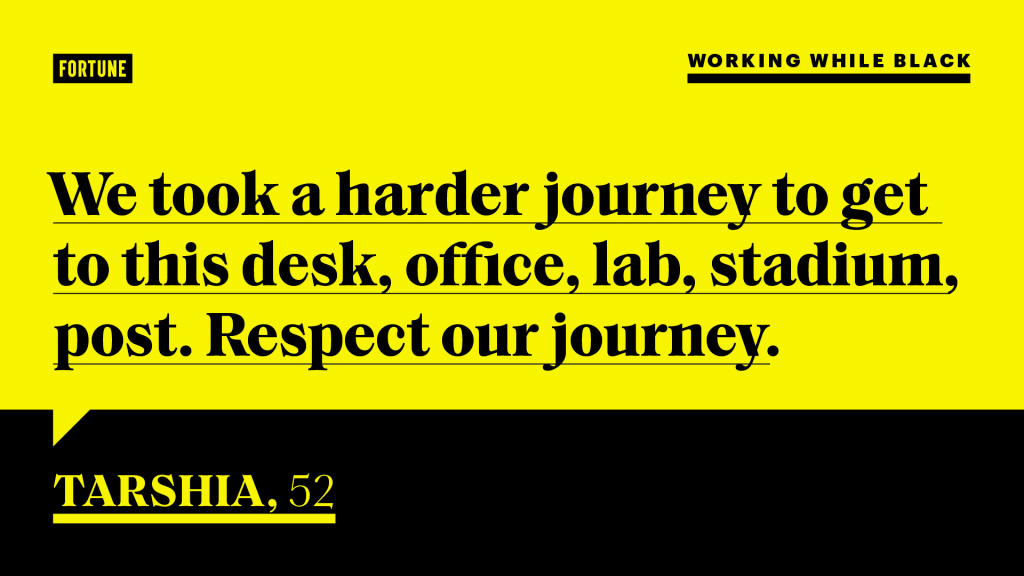
我们经历了比常人更加痛苦的历程才坐到了这张桌子前,才来到了这个办公室、实验室、体育馆和职位。我可能是一位母亲、父亲、姐姐、兄弟。我聪明、善良而且有韧劲。我是人类的一员。请尊重我们的经历,帮个忙,请不要碍事,请成为我们的支持者。——塔西亚,52岁(财富中文网)
译者:Feb
在乔治•弗洛伊德于今年5月死于白人警察之手后,抗议系统性种族歧视的活动在全美轰轰烈烈地拉开了帷幕,也促使各大公司发声声援种族平等。他们向员工和公众发布了长篇大论,声称“黑人生命亦宝贵”,承诺向社会公正机构捐资数百万美元,并将六月节(非洲裔美国人士庆祝废除奴隶制的日——译者注)定为公司的节日。面对存在问题的公司文化,高层们道歉的道歉,辞职的辞职。
但职场中的系统性种族歧视不会因为这则新闻得到解决。一项调查显示,超过半数的黑人雇员在职场中都有过受种族歧视的感受。仅有3.2%的高管和高级经理级别雇员是黑人,《财富》美国500强企业中仅有5名黑人首席执行官。另一项调查显示,黑人的薪资比白人低13%,黑人女性的薪资比白人男性低39%,比白人女性低21%。她们要求晋升和加薪的概率与白人女性相当,但结果却大为不如。
《财富》杂志联系了诸多黑人雇员,请他们分享其职场经历。我们收到了来自于高管、中层经理和初级员工的反馈,他们来自于科技、金融、媒体和娱乐、保险、非营利性机构、时尚、健康等行业。他们共同揭示了数字背后的人性,同时也证明,尽管各大公司当前说的是头头是道,但需要做的工作依然还有很多。
这些反馈已经过编辑,我们仅公布这些人的名字,隐去姓氏,以尊重他们的隐私。
一席之地
多年来,我一直在美国公司工作。随着职位的不断上升,我开始注意到黑人雇员越来越少,最后只剩下我一人。我居住的这个大城市是非洲裔美国大学毕业生比例最高的城市之一。公司的首席执行官系统性地将女性和非洲裔美国人排挤出了领导层,但我只是在袖手旁观。最终,我自己也辞职了,因为我意识到我的薪资还不到我白人同事的一半。当我质问人事部和经理有关此事时,他们面不改色地用谎言来搪塞。——布莱恩,51岁
我是一家非营利性机构的高管。这里的偏见和种族问题与企业界一样广泛存在。非营利性机构的顶层基本上都是白人男性,私营领域和政府机构亦是如此;大多数工作人员都是女性(有色人种)。我们需要进行反思,并开始采取我们呼吁私营领域和政府机构采取的同样举措,也就是努力让决策和领导层体现包容性。——莎娜,39岁
多元化和包容性之间有着很大的区别。我们不仅仅希望在同一个房间、同一个办公桌上工作,同时还希望参与决策流程。尤其是黑人女性!我们的独特能力在于将不可能的事变为可能,并赋予其他人视作无用的事物新含义。在这个世界上,黑人女性不应该只是被当作一种副产品来看待,而是应该得到肯定和歌颂。——蕾切尔,36岁
房间里唯一一个黑人
如果你是会议室、会见、交流活动或酒吧欢乐时光中唯一一名黑人,你会有什么样的感受。即便作为同一个国家的公民,但你却不得不不断地学习、迎合另一个群体的文化以及行事方式,你会作何感想?如果你因为害怕丢掉饭碗而无法站起来为自己发声,或纠正他人对你自己或自身文化和所属群体的成见,你会作何感想?如果你在自己的工作岗位上干的很好,而且资历也与你的同事相同或者更好,但却因为你“过于认真”或缺乏沟通而没有得到提拔,你会作何感想?如果你非常希望向领导层发展,但却看到在你之前没有可以参照的先例,你会作何感想?如果投资、恩惠、资助和机会都给了他人,但风险却让自己来承担,你会作何感想?为了做到尽善尽美、体现你所属种族的良好形象,你承受了很大的压力,因为一旦出现错误,你获得另外一次机会的可能性就会变得很低,这时你会作何感想?在这个世界中,你得生活、工作、养孩子,但你的肤色却让你难以进行沟通或获得保护,你会作何感想?——迪,49岁
在我的职业生活中,我的种族身份总是感觉像其他人可以随意使用的工具。我的肤色算挺白了,只要我不刻意强调我的黑人身份,人们对我也没有什么抵触。当他们需要我分享自己的洞见和谈论“黑人体验”时会把我当作黑人来看待,就像是我的声音可以解释清楚整个种群的个人和企业所有者想要或需要的事物。在工作环境中,我主动和被动地意识到,我的存在并不能为我带来与同事融洽相处的权力。——凯利,42岁
职场的多元化和包容性并不意味着设立仅满足最少人数的规定指标和感受,因为办公室有50多名员工,分为两种肤色。事实上,当你供职于一家成天喊着多元化、但办公室中仅有一个人和你是一个肤色时,你会觉得这是对自己的侮辱。由于公司成天会提醒你大家并不在同一条起跑线上,一种疏远感会油然而生。我不得不比我的白人同事更加努力地工作,为的是获得同等的尊重,同时抑制自己突出的个性,以消除那种“暴躁黑人女性”的成见或避免被别人称之为“无礼”。如果你希望打造一个真正多元化和包容的职场,你就不能只想着自己可以做的就是在办公室多安排几名不同肤色的员工。——阿兹轧,30岁
积极地招聘、聘请和提拔黑人,尤其是在领导层。通过知名第三方服务供应商,每年举办有关多元化、包容性的高质量现场培训。积极参加和举办招聘会,并从有着大量黑人人口的市区招聘人才。在黑人历史月举办特别现场活动,邀请专业演讲人士参加。——马丁,52岁
一同小酌
就摆脱偏见而言,人们在提升自我的这个重要方面做的很不够(包括非黑人有色人种),因此在伪装友好时会非常痛苦。而事实在于,我很少看到有同事愿意去与那些自己不喜欢的人交朋友或对其提供指导。人们可能会承认我的工作做的不错,但如果他们不愿和我一块“喝啤酒”,那么对于我的进步来说是一个巨大的障碍,而且自己在晋升和加薪时的境遇便可想而知。这一现象也让我对于该信任谁感到异常多疑,因为我并不知道这个人是否会利用我的劳动力。我遇到过的最佳盟友曾为我两肋插刀,帮助我进步,并为我提供难得的机会,同时指导和资助我的成长(还有支付薪资)。——吉玛尼,22岁
当有关发型和衣着的政策放开之后,我们终于可以在职场展现自我本色。有的人对此表示称赞,有的人则有不同意见。我们并非是一个模子刻出来的,允许自我表达能够让我们的文化大放异彩。——阿雷勒,30岁
我曾在多家蓝筹公司担任高管职务。我一直都在隐藏自己的黑人文化,因为我觉得在公司就该如此。作为在美国企业工作的黑人,我们所面临的压力意味着我们得压抑自己的部分情绪。我们只能高兴,不能生气。没有人提供指导,因此我们只能自己琢磨,而且当我们琢磨出来之后,最好的机会已经擦身而过,因为我们并不是“圈子”中的一员。——伯纳德,57岁
说到做到
我希望告诉我办公室的白人同事:我们已经看穿了你们这些人。我们看穿了那些从来不会付诸行动的虚伪说辞。我们看到:你会大谈特谈“多元化与包容性”,但从来不采取行动;你会让没有经验的白人小姑娘或小伙“尝试”新职务,并提拔他们,因为你本能地相信他们会在失败中前行;对于同样的工作,黑人拿到的钱比白人少。
我希望告诉白人高管,如果你打算设立资源工作组,那么为他们提供一些资金。不要将所有非白人员工放在一个组——多元文化组。不要说什么“多元化并非是让不同肤色的面孔坐在一个桌子前,而是思想的多元化”这类废话。
不要想方设法让我们相信公司具有包容性,而是要真正做到。这一点要求公司所有人都得承认你所拥有的权利,承认你在没有任何其他理由(不包括他们看起来像你)的情况下,采取了措施刻意提拔白人同事。不妨问问自己,是什么让你对黑人如此反感?问问自己,为什么自己会费尽气力去阻碍黑人的发展,如果公司所有的黑人都决定不回公司工作,这一现象会对公司的利润带来什么影响?
要采取措施,抛弃那些当前已经形成定式思维的方式。读书,并学习那些反对偏见的作品。不要再问黑人,自己如何才能摒弃种族主义或反黑人思想,这个问题应该由你自己来找到答案。——阿德瑞尼,50岁
让所有人为其在职场的言语和行为负责。包容性是每一位雇主的义务。我曾在无意间听到了一段包含种族歧视的对话,并对其内容十分反感。人力资源的第一反应是:“我确信他们没有任何恶意。”真的吗?你当时在那吗?你当时听到他们说什么了吗?不要保护这些人,要让他们为此负责。——查伦,37岁
当我们呼喊招聘、录用、留用和升职政策存在歧视时,请支持黑人教职人员,而不是将责任推给“教授治理”制度。正式承认黑人教职人员为照顾学生而付出的隐性工作。切实践行学校宣扬的包容价值。——琳内特,55岁
高层领导可以成为歧视罪魁祸首,而且会得到人力资源部门的保护。我曾经遇到过一位副总裁,在全球范围内演讲时嘴里总是念叨着多元化,但却因为讨厌黑人女性而被告到了人力资源部门。当副总裁的团队成员将这个问题反映给人事部门时,这位打报告的人被调至公司的另一个部门。这位副总裁有一个想找工作的朋友。我后来被告知,他的这位朋友(一位在这个领域毫无经验的白人女性)将向我汇报,而且我无法向人事部门抱怨,否则我将会成为这位副总裁的眼中钉。——萨查,40岁
在我工作的地方,只要涉及多元化和包容的问题,人们说的都是头头是道;见鬼,我的工作环境充满了多元化和包容性。但我也参加了有关招聘多元化人才的讨论,真的是让人很不舒服。很明显,并非我所在机构的所有人都信奉多元化和包容性原则及其发挥的作用。公司的各个层面都存在多元化问题,而且我们是前脚招聘后脚就有人辞职。我对自己晋升的能力充满了怀疑,因为我在业绩评审和晋升机会方面总会遭到歧视。
如今,我的白人同事对理解其黑人同事产生了兴趣,因为这是来自于高层的命令。我发现这种新出现的关怀不够真诚。——塔马拉,46岁
对于那些确实希望成为盟友、并支持黑人职业人士多元化和包容性的公司来说,它们需要采取周全的方式来引入这一变化。公司需要对种族平等进行更多的投入,而不是采取条件反射式的举措,例如“欢聚一堂”的说教会。虽然方向对了,但下一步该怎么走?公司需要认真负责地在各个层面和人才培养方面贯彻多元化原则,并制定行动计划来杜绝公司文化和领导层中根深蒂固的系统性种族歧视。——凯瑟琳,39岁
别碰我的头发
职场的轻度冒犯和轻微歧视让我感到窒息,而且觉得每天都在折寿。当我不得不遮盖我生来具有的肤色来融入公司时,我无法全身心地投入到工作当中。——JP,40岁
别摸我的头发。不要再用“方便”这类借口,来掩盖你的儿童刊物仅代表白人小孩的事实。不要再将我们弄混,我和我的同事虽然都是黑人,但长的并不相像。即便我们拥有能够胜任的文聘和经验,但升职依然十分渺茫,因为我们并未看见高层中有像我一样肤色的女士。如果公司打算接受并为黑人女性提供同等的机会,请确保不要按照你的标准来以貌取人,难不成我要长得像个模特一样才能得到你对白人女性那样的尊重,何况后者看起来也不像个模特,而且最重要的是,请给我同等的机会。——玛里昂,25岁
一位白人高管在弗洛伊德死后表达了其对黑人的支持。讽刺的是,他此前曾经开玩笑说,我之所以能买得起好车是因为我肯定在“倒卖东西”。这个黑人必须参与非法活动才可以买得起好东西的潜台词,也正是导致乔治•弗洛伊德和无数其他黑人被警察谋杀的观念。——莫妮卡,37岁
多年来,我一直遭受着轻度冒犯,甚至是种族歧视评论的困扰。我的第一位经理说,我太直接了,过于冲动,而且很恐怖。另一位同事称,我看起来像一个黑猩猩,原因在于我穿的夹克衫。不幸的是,我曾经自以为说这些话的人都是黑人雇员的支持者。如果多元化和包容性的“支持者们”都持有偏见,那么公司如何向多元化和包容性迈进?——夏洛特,37岁
艾米•库博事件比比皆是
艾米•库博事件比比皆是,受害者有男有女,还有这些被动攻击型的评论,以及有关“肤色”和“情绪化”黑人女性和男性的私下讨论。外向型自由主义实际上披着黑人职员恐惧和威胁论的外衣。他们挥舞着手中的权力,阻碍黑人天才的成长、进步和曝光。感觉每天都得努力去周旋,而他们的偏见却无人过问。——克里斯汀娜,34岁
我要讲的故事不止一个,但我要在这里分享那个几乎夺走我整个人生的那个故事。有人控诉我从另一位经理那里偷了一张支票,后来她自己找到了那张支票。公司办公室在没有调查的情况下开除了我。我采取了行动,将其告上法庭。如果我当时像现在这样更加睿智一些,我就不会同意庭外和解,而是会公开地讲述我曾经遭受过的待遇。——麦琪,50岁
我究竟是谁
我在白人主导的IT行业工作。作为一名黑人女性,我一直在这个他们为非白人创造、却视而不见的有毒世界与他们共事,此事让我感到心力憔悴。在他们创造的这个险恶世界中,黑人总是会因为轻度冒犯问题而被要求进行工作面试。你会感到异常孤立无援,因为没有人可以信任,而且你会看到高级别职位都被那些能力不足的白人男性或女性占据。对于黑人雇员来说,事情一直在朝不好的方向发展。
我亲眼看到我的白人同事在公司内平步青云,而且无需担心合群或接受的问题。一名黑人男性被警察谋杀了,而我的白人同事们就像若无其事一样正常生活。与此同时,我却强忍着眼泪参加各种会议。相对于一个人的生命,损坏的玻璃和大楼楼体的些许擦痕让他们感到更加痛心。与此同时,我对我们每天面对的不公正和不平等事件感到厌恶不已,而且如鲠在喉。我缓慢地呼吸,压抑着愤怒进行对话。我一直如履薄冰,我不希望被打上“愤怒黑人女性”的标签。我真的只是希望白人同事能够给我一点点同情心。反而,他们会问我项目的情况。我的沉默被他们看作缺乏互动。当我对那些冷笑话无动于衷时,他们会认为我是一个冷漠的人。这种阴险的文化在种族歧视问题上一点也不显山露水,但却能够通过各种方式让你知道你的人生、教育和经历是无关紧要的,而且永远是不够的,这种感觉不亚于凌迟处死。——欧文,42岁
我们经历了比常人更加痛苦的历程才坐到了这张桌子前,才来到了这个办公室、实验室、体育馆和职位。我可能是一位母亲、父亲、姐姐、兄弟。我聪明、善良而且有韧劲。我是人类的一员。请尊重我们的经历,帮个忙,请不要碍事,请成为我们的支持者。——塔西亚,52岁(财富中文网)
译者:Feb
After George Floyd’s death at the hands of a white police officer in May, protests against systemic racism have geared up again across the country, prompting companies to speak out in support of racial justice. They're sharing lengthy statements declaring "black lives matter" to staff and the public, pledging millions to social justice organizations, and marking Juneteenth as a company holiday. Leaders are apologizing and resigning over problematic company culture.
But systemic racism within the workplace won't be resolved in one news cycle. Over half of black employees have felt racism at work, one study shows. Only 3.2% of executives and senior manager–level employees are black, and only five Fortune 500 CEOs are. Black men are paid 13% less than white men; black women are paid 39% less than white men and 21% less than white women, according to another study. They ask for promotions and raises at about the same rate as white women, but get worse results.
Fortune put a call out for black employees to share their experiences in the workplace. We received responses from executives, middle managers, and entry-level staffers; we heard from people working in tech, finance, media and entertainment, insurance, nonprofits, fashion, health, and more. Altogether, they reveal the humanity behind the numbers. And they reveal that no matter what companies are saying right now, there is much work to be done.
The responses have been lightly edited. We've published only first names to respect the privacy of the contributors.
****
A seat at the table
For many years, I've worked in corporate America. As I slowly moved up the corporate ladder, I began to notice there were fewer black employees until I was the only one. I live in a major city with one of the largest percentages of African-American college graduates, so the talent pool is there. I watched as the CEO of our company systematically forced out women and African-Americans in leadership. Eventually, I myself resigned because I learned I was being paid less than half of what my white colleagues earned. When I confronted HR and my manager about it, they blatantly lied to me. —Bryan, 51
I'm a nonprofit executive. The issues of bias and racism are as pervasive here as in the corporate world. The top of nonprofits is predominantly white and male, as it is within the private sector and government; most worker bees are women (of color). We need to hold the mirror up to ourselves in this sector and start adopting the same actions we call on the private sector and government to take by doing the work to make inclusivity visible at the decision and leadership levels. —Sanaa, 39
There’s a major difference between diversity and inclusiveness. We want to not only be in the room, not only be at the table, but also contribute to the decision-making process. Especially black women! We have a unique ability of turning the impossible to possible. Taking what others see as useless and finding purpose. It’s a by-product of simply being a black woman in this world, and something that should be recognized and celebrated. —Rachael, 36
The only one in the room
I want you to know how it feels to be the only one that looks like you in a conference room, in a meeting, at a networking event or happy hour. I want you to know what it feels like to constantly have to assimilate and ingratiate yourself in to another group's culture and way of doing things even though you're citizens of the same country. I want you to know what it feels like to not be able to stand up for yourself or correct someone's assumption about you or your culture or community for fear of losing your job. I want you to know what it's like to be effective in your role and have the same or more credentials as your peers, but be passed over for promotions because you're "too serious" or because there's a lack of connection. I want you to know what it feels like to desire to move up the ladder and see there are no other examples like you that you can follow. I want you to know what it feels like to see investments made, grace extended, sponsorship provided, risks taken, and opportunities given to and for others but not you. I want you to know the pressure that comes with trying to be perfect and represent your race well because if you make a mistake, the odds of you being given another opportunity are slim. I want you to know what it feels like to live, work, and raise your children in a world where you don't have the complexion for the connection or the protection. —Dee, 49
In my professional life, my race always feels like an exercise in others’ conveniences. I am white enough that people are comfortable with me, as long as I don’t call too much attention to my blackness. I am seen as black when they need me to shed insight and speak to the “black experience”—as if my voice could possibly explain all thoughts and opinions on what an entire race of individuals and business owners want or need. While in the work setting, I am actively aware and reminded that I do not have the privilege of fitting in just by sheer existence. —Kelli, 42
Diversity and inclusivity in the workplace doesn’t mean having a set quota and feeling satisfied at the bare minimum because you have two people of color in your office of 50-plus employees. In fact, it feels insulting when you’re hired by a company that repeatedly shouts diversity but only one other person in the office actually looks like you. It becomes alienating as there’s a constant reminder that we are not equal. I have to work harder than my white counterparts just to get equal respect all while suppressing my big personality in order to dispel the "angry black woman" stereotype or not be called "sassy." If you want to create a truly diverse and inclusive workspace, you have to stop thinking that a splash of color here and there is the best you can do. —Azizza, 30
Actively recruit, hire, and promote black people, particularly into leadership positions. Hold annual, high-quality diversity and inclusion training on-site through a reputable third-party vendor. Actively hold job fairs and recruit talent from metro areas with significant black populations. Actively visit and hold job fairs and recruit talent from HBCUs. Hold special events on-site during Black History Month; invite professional speakers. —Martin, 52
Grabbing beers
People are simply not doing enough of the critical self work to unpack their biases (nonblack people of color included), so it makes it soul crushing to attempt to be friendly, beyond the fact that I have rarely seen coworkers care to befriend or mentor people who don't look like them. People can acknowledge that I do good work, but if they don't want to "grab beers" with me, it's incredibly limiting for my progress, not to mention how that translates when it's time for promotions and raises. It also makes me especially paranoid about who I can trust, because I am unsure of who might exploit my labor. The best allies I've met have stuck their necks out for me, helped me climb, and gave me rare opportunities, mentoring and sponsoring my growth (and paycheck). —Kimani, 22
When policies regarding hair and clothing were relaxed, we were finally able to be ourselves at work. This led to compliments and conversations. We don’t all fit one mold; allowing expression allowed our culture to shine. —Arelle, 30
I have held executive positions at various blue-chip companies. I have hidden my black culture all my life because I thought it was the "corporate" thing to do. The stress of being a black man in corporate America means we can't have the full range of emotions. We can only be happy—never angry. No mentors, so we just have to figure it out. And by the time that we do, the great opportunities have passed us by, as we weren't part of "the network." —Bernard, 57
Walking the walk
I'd like the white folks at my office to know: We see you. We see through all the insincere words that are never followed by action. We see that you talk the talk of "diversity and inclusion," but we know that you don't walk the walk. You allow inexperienced white girls and guys to "try" new positions and advance in their careers because you intrinsically trust them to fail forward. We see that you pay the black people less than the white people for same work.
I'd like the white folks in leadership to know that if you are going to have employee resource groups, have some funding for them. Stop lumping all the nonwhite people into one group—the multicultural group. Stop the BS about how "diversity is not about having different-color faces around a table, but about diversity of thought."
Stop trying to convince us that you are inclusive and just be inclusive. That would require you all to acknowledge your privilege and acknowledge the actions you've deliberately taken to elevate your white counterparts for no other reason than that they look like you. Ask yourselves, what is it about black people that makes you so uncomfortable? Ask yourselves, why do you go out of your way to hold black people back—by paying them less than their white counterparts, by not promoting them? Ask yourselves, if all the black people at your company decided to never come to work again, how would that affect your bottom line?
Do the work to unlearn the ways that are currently ingrained into the fabric of who you are. Read books. Learn from those that are doing the anti-bias work. Stop asking black people how you can be not racist or antiblack; that's your job to figure out. —Adrienne, 50
Make everyone accountable for their words and actions in the workplace. Inclusion is every employee’s responsibility. I overheard a racist conversation and was offended by what was said. First response of HR: “I’m sure they didn’t mean any harm.” Really? Were you there? Did you actually hear what was said? Stop protecting people and hold them accountable. —Charlene, 37
Support black faculty when we call out biases in hiring, admissions, retention and promotion policies, rather than deferring to “faculty governance.” Formally acknowledge the hidden work that black faculty perform to care for our students. Actually live up to the inclusion values that you espouse. —Lynette, 55
Senior leadership can be the worst perpetrators of discrimination and will be protected by HR. I’ve had a VP be vocal about diversity on stages worldwide, yet be reported to HR for their dislike of black women. When this was reported to HR by someone on the VP's team, the reporting member was removed to another part of the organization. This same leader had a friend in need of a job. I was told that this friend (a white woman with no experience in the field) would be reporting to me and that I couldn’t complain to HR or I would be blackballed by the VP. —Sacha, 40
I work within an environment where they say all the right things as it relates to diversity and inclusion; heck, I work in D&I. But I have been privy to conversations around hiring diverse talent that would make your skin crawl. It’s obvious that not everyone in my organization believes in diversity and inclusion and the role they play. We struggle with having diversity at all levels, and they are walking out the door just as fast as we are able to hire. I have doubted my own abilities to be able to move up as I continue to face bias during performance reviews and promotion opportunities.
Now my white colleagues are showing an interest in understanding their black colleagues because it’s been a directive from our senior leader. I'm finding the newfound attention a little insincere. —Tamara, 46
For companies to be authentic allies and support diversity and inclusion for black professionals, a thoughtful approach to instilling change is needed. More investments need to be made towards racial equality instead of knee-jerk reactions like “kumbaya” listening sessions. It’s a step in the right direction, but what’s next? Companies need to be accountable by committing to diversity hiring at all levels, talent development, and building action plans to eliminate systemic racism built into corporate cultures and leadership. —Katherine, 39
Don’t touch my hair
With the microaggressions and microinequities in the workplace, I feel strangled and die a little bit every single day. I cannot bring my whole self to work when I have to cover up the skin that I'm born with to fit in. —JP, 40
Don't put your hands in my hair. Stop using excuses such as "convenience" for the fact that you only represent white children in your publications for children. Stop mixing us up—just because my colleagues and I are black does not mean we look alike. It's hard to feel hopeful for a promotion, even with the right diploma and experience, because I literally do not see women who look like me in higher positions. If you're going to accept and give an equal chance to black women, please make sure it's not just the ones who conform to your standard when it comes to physical appearance—I shouldn't have to look like a model for you to respect me like you respect my white counterparts who certainly do not look like one, and most importantly, to give me the same chances as them. —Marion, 25
A senior white male leader expressed his allyship after George Floyd's death. The irony is he previously made a joke about my being able to afford my luxury vehicle because I must be "moving kilos." That undertone that black people must be engaged in illegal activities to have nice things is the same way of thinking that lead to George Floyd's and countless other murders by police. —Monica, 37
I have been subjected to years of microaggressions and even racist comments. My first manager said that I was too direct, aggressive, and just scary. Another colleague said that I looked like a gorilla because of a jacket. Sadly, these statements were made by colleagues who believe themselves to be allies of black employees. How can you accomplish real change in diversity and inclusion when even the “allies” for D&I hold prejudiced views? —Charlotte, 37
The Amy Coopers everywhere
There are Amy Coopers everywhere, in male and female form. The passive-aggressive critiques, the whispers about "tonal" and "emotional" black women and men. The outward liberalism but actual fear and perceived threat of black professionals. They wield their power to stop growth, advancement, and exposure of black talent. It feels like combat each day to do the dance while their bias goes unchecked. —Christina, 34
I have several stories, but will share the one that almost took my entire life away from the rest of the world. I was accused of stealing a check from another manager. She later found the check. Corporate office fired me without investigating. I took action and sued them. If I was wiser, like I am now, I would have not settled out of court and would have publicly spoken on the way I was treated. —Maggy, 50
Ask how I am
I work in the IT field, which is dominated by white men. As a black woman, it is exhausting to work alongside colleagues who are so blind to the toxic world they create for anyone nonwhite. They create a venomous environment where a black person is always required to interview for their job due to microaggressions. You are so alone with no one to trust, watching every open senior-level position be filled with less-than-qualified white men or women. The needle is always moving for black employees.
I watch as my white colleagues move with fluidity within the organization with zero concerns about fitting in or being accepted. A black man was murdered by police and my white peers just move through life like absolutely nothing happened. Meanwhile, I'm fighting back tears to push through meetings. They are more hurt and pained by broken glass and a few scratches to a building than by a man's life. Meanwhile, I’m sickened by all the continuous injustices and inequalities that we face everyday. The pain is in my throat, and I breathe slowly to try and say my words without anger and rage. I constantly walk on eggshells; I don’t want to be labeled as the "angry black woman." I desperately want just a small fraction of empathy and compassion from my white peers. Instead, they ask me about a project status. My quietness is viewed as a lack of engagement. When I don’t laugh at the dry jokes, I’m viewed as being aloof. This insidious culture is never blatant with its racism but extremely methodical in letting you know that your life, education, and experience does not matter and will never be enough. It’s death by a billion paper cuts. —Qwen, 42
We took a harder journey to get to this desk, office, lab, stadium, post. I’m a mother, father, sister, brother. I am intelligent, kind, and resilient. I am human. Respect our journey. Help don’t hinder. Be an ally. —Tarshia, 52






